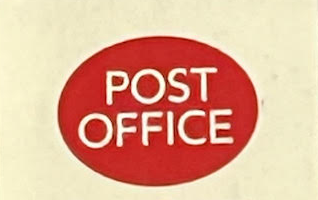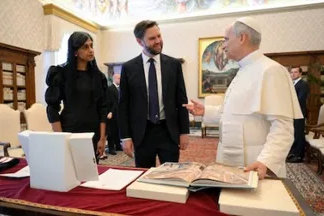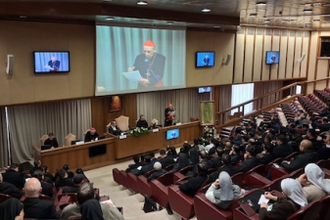Ian Linden: Governance and the Post Office scandal

Image ICN/JS
"An excoriating picture of a shamefully dysfunctional political culture". Not a comment on the recent ITV series Mr. Bates vs. The Post Office. This is Rowan Williams, the former Archbishop of Canterbury, on the back cover of Rory Stewart's Politics on the Edge: A Memoir from Within Jonathan Cape 2023. Yet the book exposes the profound weaknesses in governance that enabled the Post Office scandal.
Stewart's book focuses on the story of his decade in Tory politics and government from 2009-2019. Peter Hennessy, crossbench peer and constitutional historian, described it as 'a study in pain and disillusionment.' Michael Ignatieff, former Liberal Party leader of the Opposition in Canada and distinguished academic, spoke of its portrayal of 'lying, incompetence and treachery'.
These three reviewers are all accomplished authors. Two bring exceptional political experience to their writing. Stewart's account carries conviction with those who ought to know.
The book provides an explanation for how government can speak of appointing 150 additional judges to speed up the deportation of asylum seekers and migrants to Rwanda, judged an unsafe country by our Courts, whilst, allegedly through lack of staff, taking many years to process compensation for unsafe convictions of sub postmasters and mistresses, pillars of the community.
Rory Stewart shares many of his reviewers' writing skills keeping the reader turning the pages as he talks about his epic walks in Asia and the Middle East and his professional life as a soldier before entering politics. There are insights from his different roles in Afghanistan, the group think and disastrous levels of conviction bias that ended in the bungled evacuation from Kabul in August 2021.
Maybe he is one of those "unpatriotic, Britain-belittling doom-mongers". This is from a recent Lancaster House speech by our Secretary of State for Defense, Grant Shapps, rated as one of the government's best communicators, who in the past communicated using four different names and whose political career recently included, within two years, four different Ministries. Or put in another way, Stewart tries to tell the truth about politicians like Shapps and knows what he's talking about.
Politics on the Edge is not just a litany of lying and dysfunction. There are witty descriptions of the humiliations involved in getting selected for a parliamentary constituency while failing to present always the Party line. Then follows the main story of the rocky road he walked as a Member of Parliament.
His first boss, David Cameron, gets few praise-notes. Despite practical steps to increase diversity in the Party, the members of Cameron's inner circle were Etonians (like Stewart himself), so policy was decided by 'an unimaginably narrow social group'. Stewart shows considerable self-awareness acknowledging the greasy pole Cameron had to climb to become Prime Minister. But he and Cameron were chalk and cheese.
A common criticism of Rory Stewart is that he was, and remains, 'naive'. At first, he lacked knowledge and experience of the snakes and ladders of political life, but he brought to the job the wisdom and judgement he had developed in different contexts. At times acting out of conscience without being, Corbyn-style, a professionally disloyal parliamentarian he risks defying the Tory Whips. By the time Boris Johnson pushed him out of Conservative politics in 2019 he had become a national figure.
In contrast to Yes Minister's portrayal some may even find his treatment of top civil servants to be too understanding and benign. They keep things going while Ministers come and go but they can be stubborn and evasive - at times successfully resisting policy change. Stewart found the power relations in the Department for International Development, as both Minister and as Secretary of State, particularly trying. While acknowledging the important role of aid in the global projection of the UK and giving Cameron credit for his commitment to 0.7% GDP, he encourages the suspicion that the department with an annual budget of "£13 billion more than ten times the core budget of the British Foreign Office" was a little too big for its boots. Yes, but the Foreign Office is not a Ministry funding projects globally. And DFID and FCO were of course later amalgamated by Johnson with hostile intent
Stewart got on well with Theresa May who made him a rather reluctant Minister of State for prisons in the Ministry of Justice. This is where his passion for practical action best shines out. Prisoners are grabbing drugs delivered by drones hovering outside broken windows - mend the broken windows, do a few simple reforms. Reading Stewart's account of prison conditions and their neglect by government is deeply shaming. It raises questions about our claim to be a civilised society. And in parenthesis, the absence of any mention of conversations with prison chaplains by such an advocate of 'listening' is some measure of his - admitted - general distaste for religion.
To read on see: www.ianlinden.com/latest-blogs/governance-the-post-office-scandal
Professor Ian Linden is Visiting Professor at St Mary's University, Strawberry Hill, London. A past director of the Catholic Institute for International Relations, he was awarded a CMG for his work for human rights in 2000. He has also been an adviser on Europe and Justice and Peace issues to the Department of International Affairs of the Catholic Bishops Conference of England and Wales. Ian chairs a new charity for After-school schooling in Beirut for Syrian refugees and Lebanese kids in danger of dropping out partnering with CARITAS Lebanon and work on board of Las Casas Institute in Oxford with Richard Finn OP. His latest book was Global Catholicism published by Hurst in 2009.


















